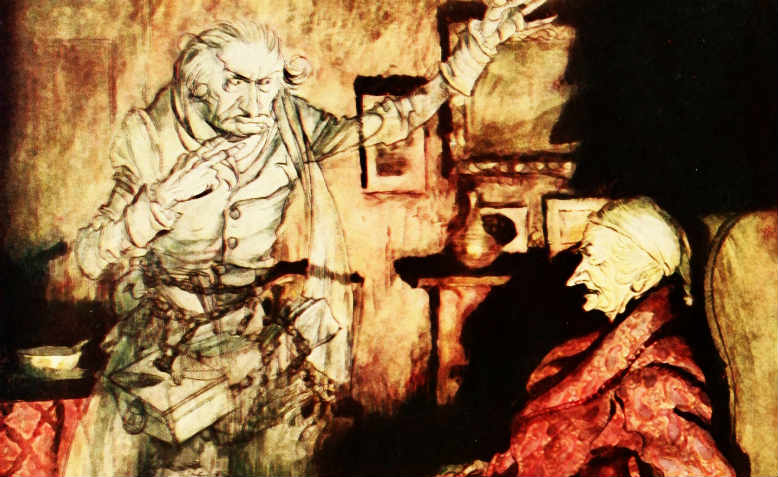This week, a woman at my church faces the harrowing decision between two Christmases. On the one hand, she could join a few friends and the son from which she has been estranged, risking the possibility of running into the guy who things “didn’t work out with.” It would be too uncomfortable for her to ask the hostess whether this man has RSVP-ed one way or the other. On the other hand, she could join the just-this-month widowed survivor of a great man whose 15 years with ALS have just ended. She is the widow’s tenant and has not been formally invited to celebrate Christmas there, and it would be uncomfortable to presume upon her hospitality by inviting herself over.
Christmastime is not simple, nor is it a time when many of us have the patience for sentimental surface-level treatments of the meaning of family, the Christian meaning of the holiday, and its festive and moral imperatives. We need literature with teeth.
Charles Dickens’ A Christmas Carol is so dear and simple a story that, over time, it has functioned more as a cultural repository of domestic holiday sentiment than of real Christian hope. One reason is that most of our exposure to Dickens’ story is mediated through the 1984 film starring George C. Scott. Another is that, whether in the film or in the novel, Dickens appears to uphold a romantic and sentimental—you might even say Dickensian—view of the family: a happy place wherein to celebrate Christmas.
But for Dickens, Christmas is really about Death.
It’s a major theme of his novel—ghosts, tombstones, and Tiny Tim—but it is the central focus of an essay he published in 1851, eight years after writing A Christmas Carol, titled “What Christmas is as We Grow Older.” Read the essay yourself. The remainder of this post will offer appreciative commentary on the essay, draw connections between the essay and the novel, and noting implications for our own praxis of Christmas.
“We will shut out nothing”: Celebrating Christmas like an Adult
Dickens begins by briefly commenting on the power of Christmas to bind all of our personal loves together under the fireplace:
Time was, with most of us, when Christmas Day encircling all our limited world like a magic ring, left nothing out for us to miss or seek; bound together all our home enjoyments, affections, and hopes; grouped everything and every one around the Christmas fire; and made the little picture shining in our bright young eyes, complete.
If “Time was” once that way, “Time came” when the traditional retreat to the hearth began to remind us of what was missing: earnest ambitions and hopes left unfulfilled, siblings whose turning aside to various vices has estranged them from us, amicable and lovely company that has been beset with new relational tensions, reminders of the one we loved has chosen not to love us back. In the face of this, our choice then seems to be between (a) reflecting on the pressing pain of loss and imagining how much better Christmas could have been this year and might be in years to come, and (b) putting away or tamping down the pain and “being grateful for what we do have.” But Dickens asks the paradigmatic question of Christian hope: ¿Porque no los dos?
We are, or should be, strengthened by the unaccomplished visions of our youth; for, who shall say that they are not our teachers to deal gently even with the impalpable nothings of the earth!
Therefore, as we grow older, let us be more thankful that the circle of our Christmas associations and of the lessons that they bring, expands! Let us welcome every one of them, and summon them to take their places by the Christmas hearth. (JF: “Take their places” strongly suggests that these losses and their lessons really do rightly belong at our Christmases.)
Welcome, old aspirations, glittering creatures of an ardent fancy, to your shelter underneath the holly! We know you, and have not outlived you yet. Welcome, old projects and old loves, however fleeting, to your nooks among the steadier lights that burn around us. Welcome, all that was ever real to our hearts; and for the earnestness that made you real, thanks to Heaven! (JF: Notice that his ‘Welcome’ of hospitality dignifies the hopes and dreams we have lost, granting them real-ness we grant people we have lost. It also dignifies the reality of others’ lost hopes and dreams on the basis of the earnestness with which they loved them. Acknowledging the earnestness of our company’s loves creates a sympathy for them in us.)
Welcome, everything! Welcome, alike what has been, and what never was, and what we hope may be, to your shelter underneath the holly, to your places round the Christmas fire, where “what is” sits open- hearted! (JF: Recognize the not subtle Past-Present-Future formula used here and embodied by the ghosts in his novel. Also notice the “has been, never was, and hope may be” formula that begins Eliot’s Four Quartets. For what it’s worth, I think Eliot’s view of memory and purgation is anticipated here by Dickens.) In yonder shadow, do we see obtruding furtively upon the blaze, an enemy’s face? By Christmas Day we do forgive him! If the injury he has done us may admit of such companionship, let him come here and take his place. If otherwise, unhappily, let him go hence, assured that we will never injure nor accuse him. (JF: This is the spirit displayed both by the Cratchit family and Scrooge’s nephew’s family, both of whom raise cups of Christmas “spirits” to Scrooge’s honor on the tour led by the Ghost of Christmas Present, despite the sideways voices that would disparage him. Scrooge is invited to their Christmases, and his hosts have nothing but pity for his self-harming decision to seclude himself.)
On this day we shut out Nothing!
By this point, halfway through his essay, Dickens has acknowledged, and not written off, the child’s innocent assessment of Christmas. It is true for the child, or for many children, that Christmas succeeds in uniting all of their loves and joys and comforts in one bond underneath the Christmas hearth. Adult cynicism has no right to begrudge them that. The adult must conform her view of Christmas to the child’s view Christmas by, through her hospitality, welcoming all that was, could have been, and could be into the Christmas that “is” this year. The adult and whatever iteration of family in which she finds herself will be bound together by their Christian hospitality toward “all that was ever real to our hearts.”
“We will turn our faces”: Hospitality unto Resurrection
The second half of the essay begins with an abbreviated dialogue between the essayist’s voice and the voice of death:
“Pause,” says a low voice. “Nothing? Think!”
“On Christmas Day, we will shut out from our fireside, Nothing.”
“Not the shadow of a vast City where the withered leaves are lying deep?” the voice replies. “Not the shadow that darkens the whole globe? Not the shadow of the City of the Dead?”
Not even that. Of all days in the year, we will turn our faces towards that City upon Christmas Day, and from its silent hosts bring those we loved, among us. City of the Dead, in the blessed name wherein we are gathered together at this time, and in the Presence that is here among us according to the promise, (JF: Christ and the Holy Spirit, of course. Dickens is a Trinitarian Christian.) we will receive, and not dismiss, (JF: Hear the distinct and firm decision in favor of hospitality) thy people who are dear to us!
The Christian practice which Christmas spurs us on to celebrate is our personal confession of the pain of the loss of our loves. This is how the Ghost of Christmas Past saves Scrooge’s soul: by forcefully pinioning his remembrance upon his dear, deceased sister; the sorrowful eyes of his ex-fiancee who loved him fiercely, who released him to pursue his love of money, and whose beautiful daughter could have been Scrooge’s own; the raucous ball at Fezziwig’s at which his master decried his stinginess and workaholism, strong-arming him into having a good time. Scrooge looks on all of these lost loves and weeps inconsolably. Christmas is a time for Christian joy, and the Ghost of Christmas Past argues that the way into joy is through the grief that is a direct consequence of turning his face toward his lost loves.
Perhaps this is what is meant by “Practice resurrection,” the puzzling last line of Wendell Berry’s great poem, “Manifesto: The Mad Farmer Liberation Front.” Or perhaps this is part of what is meant by Christ’s strange proof-text for the resurrection: “And as for the dead being raised, have you not read in the book of Moses, in the passage about the bush, how God spoke to him, saying, ‘I am the God of Abraham, and the God of Isaac, and the God of Jacob’? He is not God of the dead, but of the living. You are quite wrong.” (Mk 12.26-27)
The thrust of this piece of dialogue, its coherence with the ministry of the Ghost of Christmas Past, and its associations with other Christian literature, is that the way to treat the disappointments with Christmas that comes with time is to frame our disappointments as lost loves, to turn and face them together, and to give them a place in our homes and in our celebrations of this, the “the season of immortal hope” and “birthday of immortal mercy.”
Lost friend, lost child, lost parent, sister, brother, husband, wife, we will not so discard you! You shall hold your cherished places in our Christmas hearts, and by our Christmas fires; and in the season of immortal hope, and on the birthday of immortal mercy, we will shut out Nothing!
How wonderful would it be if all of our families and communities were places full of people who frankly acknowledged their own—and others’—profoundly real loss of profoundly real hopes, dreams, and people, turned their faces together toward them, and celebrated Christmas with both-eyes-open hospitality?
Christian Christmas and Dickensian Discipleship
I think there is a straightforward counter-argument to Dickens’ thesis: Why focus your hospitality on that which and those whom are not present when you could focus your hospitality on those who are? In his essay, Dickens doesn’t say a word about Christian charity toward the poor and the lonely. His thesis on this, I think, is that hospitality to the stranger and the alien begins with hospitality to the familiar. Recall that when he addresses the City of the dead regarding “those we loved,” he calls them “thy people who are dear to us.”
Dickens alienates his loves in order to receive them again.
In essence, what he says is this: “Dear Death, those who once belonged to us now belong to you. They are your people. We nevertheless receive them as they are. They will be present to us in the mode that is allowed them.” As a supernaturalist—lol, he writes ghost stories!—he also holds a strong and present category of resurrection today:
There was a dear girl—almost a woman—never to be one—who made a mourning Christmas in a house of joy, and went her trackless way to the silent City. Do we recollect her, worn out, faintly whispering what could not be heard, and falling into that last sleep for weariness? O look upon her now! O look upon her beauty, her serenity, her changeless youth, her happiness! The daughter of Jairus was recalled to life, to die; but she, more blest, has heard the same voice, saying unto her, “Arise for ever!”
The “as they are” is resurrected and transfigured. Our dashed hopes for future friendship—”We had a friend who was our friend from early days, with whom we often pictured the changes that were to come upon our lives, and merrily imagined how we would speak, and walk, and think, and talk, when we came to be old.”—our fractured marriages, broken relationships with relatives, and aborted ambitions are alive now in and with Christ and, to the eye of faith, in their resplendent spiritual beauty.
Alienating our loves prepares us to love the alien. The charitable fruits of Scrooge’s conversion are (1) an unspeakably and breathtakingly large donation to the poor-houses, (2) euphoric delight in his common man, and (3) spiritual adoption of Tiny Tim, “to whom he became a second father.” It is through the morbid and purgative fixation on his lost loves that Scrooge becomes a happy man, a celebrant of Christmas, and a model of Christian charity.
As you celebrate Christmas this weekend, turn your faces together—actually, set them like a flint—toward the painful fact of your lost loves, enlist your friends and family in the communal work of Dickensian remembrance, and receive Jesus Christ, who came with a sword to lead us into a life of purgation and hospitality that is Death unto Resurrection.





Leave a Reply
Your email is safe with us.